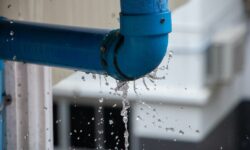Field Chemistry 101: How Well Do You Know Your Lubricants & Cleaners?
Using the wrong type of solution on a camera dome can damage the plastic. Tech expert Bob Dolph breaks down everything you need to know about commonly used chemicals.

In my never-ending pursuit of what technicians need to know as professionals, I stumbled on a subject that we rarely talk about in the world of electronic security. The subject is the chemicals we might call on to make our daily lives easier as a technician.
Many of you are familiar with the Occupational Safety and Health Administration (OSHA) for guidelines on safety in the workplace. However, do you follow the rules listed in its Safety Data Sheets (SDS) for potentially harmful chemicals in the workplace?
SDS documents have gone through several evolutionary stages over the years, such as Material Safety Data Sheets (MSDS) in 2012, compliance with the Global Harmonized System (GHS) in 2013 and SDS in 2015.
OSHA requires that every company that handles chemicals have on file a MSDS/SDS manual listing the MSDS/SDS sheets for every chemical they use.
This is good for both proper handling training and for quick emergency reference such as fire, exposure and toxicity. There should be a chemical manufactured supplied MSDS/SDS for every chemical you use in this reference book.
Since your service van is an extension of your business you should have a similar MSDS/SDS book and/or reference source immediately available. Someone in your company should be responsible for maintaining this book and plan accordingly.
There are times in our service world where we have to use lubrication chemicals. How much do we really understand about them? Are we using the correct lubricant for the job? Let’s take a closer look.
Oils – These are thin liquids that are made of long polymer chains. Certain additives such as antioxidants, corrosion inhibitors and detergents help to fortify the oils. The lower the oils “weight” the thinner the oil.
Greases – Made by mixing oils with lithium–based soap thickeners. They may also include graphite and Teflon. This lubricant will adhere to surfaces better and even act as a barrier to protect against contaminants.
Penetrating Lubricants – Special low viscosity lubricants that get in the cracks between such things as nuts and bolts. They have additives that help with such things as breaking up rust.
Dry Lubricants – These are made up of small lubricating particles such as graphite, molybdenum disulfide, silicone and PTFE (Teflon). Often come in a foam that will dry quickly leaving a very slippery thin film.
I have put together a list of chemical products that you might want to consider for your service truck. You may already have some of these, but I hope you find a few new discoveries.
Lubricants
Houdini Lock Lube – This is very popular with the locksmith trade and has been used by them for over 40 years.
WD-40 – Has been around forever. However, be careful how you use it. It is not totally universal. Did you know the “WD” stands for water displacement? Note that they now have many flavors of WD-40 to fit your specific application.
CRC – Another very diversified line of proven lubricants and cleaners. Did you know they also have a smoke detector tester?
Tri-Flow – A versatile multipurpose lubricant recommended by many in the trade. Check out the manufacturer’s online torture test videos.
LPS 1 – A greaseless lubricant that penetrates quickly, displaces moisture and will not attract dust or dirt. Another popular trade lubricant for cables, locks, relays, hinges and electronic connectors.
Super Lube – Perfect for lubricating O-rings and gaskets on outside enclosures. Make extra careful to use silicone and NOT petroleum based lubricants with plastic and rubber gaskets.
Klein Tools Wire Pulling Foam – No–mess formula lubricant that makes wire pulling easy.
Cleaning
Many of the multipurpose lubricants mentioned above have variations that can be used to clean and degrease. Below are some additional and handy cleaning solutions.
Rain-X Plastic Water Repellent – Many techs are attracted to using the water–repelling properties of Rain-X for cleaning and warding off water droplets on outside camera domes. DO NOT use the standard Rain-X as it contains acetone, ethanol and isopropanol which will damage lexan and other plastic type clear camera domes. You may want to consider the plastic version but check with the camera manufacturer first.
Novus 1 – A quality clean and shine solution for all types of plastics. Another option for possible use on clear plastic camera domes. Resists fogging, repels dust and eliminates static.
Dotworkz Pro-Clean – Cleaning solution specially designed for camera lenses and domes. Solution is used in the DomeCleanerPRO tool series (see Tool of the Month).
DeoxIT – One of my top 10. Great for electrical contacts on relays, switches, plugs/jacks. Removes oxidation and corrosion, fixes intermittent signals and lubricates connections.

Tool of the Month
Video looking fuzzy? It may be your camera lens or dome needs cleaning. Thirty feet up? No problem with the Dome Cleaner Pro from Dotworkz.
This specially designed cleaning tool on a carbon fiber telescopic pole with the Dotworkz Pro-Clean solution will do the trick.
If you enjoyed this article and want to receive more valuable industry content like this, click here to sign up for our FREE digital newsletters!

Security Is Our Business, Too
For professionals who recommend, buy and install all types of electronic security equipment, a free subscription to Commercial Integrator + Security Sales & Integration is like having a consultant on call. You’ll find an ideal balance of technology and business coverage, with installation tips and techniques for products and updates on how to add to your bottom line.
A FREE subscription to the top resource for security and integration industry will prove to be invaluable.








